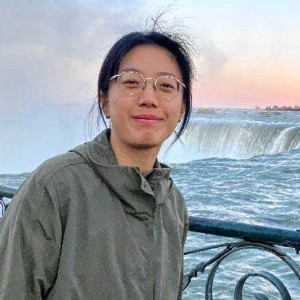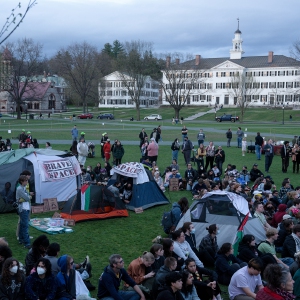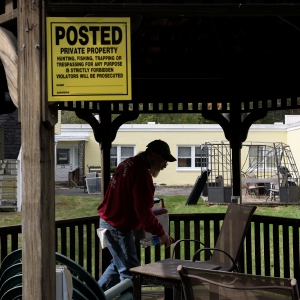Upper Valley large animal vet is a rare breed
| Published: 08-06-2023 1:56 PM |
The first call of the day, to vaccinate a treasured cow and her calf, exemplifies what Taylor Hull loves about her job.
Anna Poulin, one of the daughters in Poulin and Daughters Family Farm in Randolph, plans to take her cow Peaches and her calf to the Tunbridge Fair, so they needed vaccinations. Routine work for a large animal veterinarian, but also a chance to witness a special bond.
“Every farm girl has to have their cow,” Hull said. “There has to be one.”
Poulin, a soft-spoken 23-year-old, did not disagree.
Hull has known since she was four or five years old that she wanted to be a vet. Tom Stuwe (pronounced stew-ee), a vet based in Barre, Vt., came to Hull’s family’s farm in Royalton to treat milk fever in a cow that’d recently given birth. Milk fever is a debilitating shortage of calcium in the bloodstream that’s usually fatal if untreated. He drove his truck out into the pasture to reach the patient.
“That is my first memory,” said Hull, now 30, looking out over the pasture where that memory took root. “I want to drive that truck around.”
That’s what Hull does most days, and her rounds on a recent summer day started with her visit to Anna Poulin and Peaches. A practicing vet for only two years, Hull is feeling a bit alone as she does so. A generation of large animal vets has retired, and not enough new ones have stepped in to replace them.
“I think it’s a very big issue,” Hull said. “There’s just not enough of us.”
Article continues after...
Yesterday's Most Read Articles
 Police seek assistance in locating missing Dartmouth student
Police seek assistance in locating missing Dartmouth student
 City cites Claremont property owner over demolition of building
City cites Claremont property owner over demolition of building
 Editorial: Dartmouth lets protesters know where they stand
Editorial: Dartmouth lets protesters know where they stand
 DHMC union organizers say they have enough signatures to force vote
DHMC union organizers say they have enough signatures to force vote
 A Life: Elaine Chase ‘was a very generous person’
A Life: Elaine Chase ‘was a very generous person’
Both Stuwe and Will Barry, another longtime Central Vermont vet, were mentors to Hull, but both retired just as she started her practice, which is part of Randolph Regional Veterinary Hospital. So she’s been learning on the job. The previous Saturday she’d performed her first Caesarian section on a goat, and it went well.
“I’m feeling comfortable with the basics,” she said. “I’m trying to push myself to take that next step.”
On a given day, though, much of what she does consists of “basics,” such as her visit with Peaches. At the Poulin farm she also looked at a calf with a hind-leg problem. The cause was unclear: A shortage of vitamin E and selenium, which are deficient in Vermont hay? A knock sustained in the pasture? A neurological issue? Diagnostic tests are expensive, so Hull counseled time and patience.
A Jersey calf at Chet Abbot’s farm in Randolph, the next stop, required more immediate care. It had a grapefruit-sized lesion under its throat.
On the way to Abbot’s farm, Hull picked up Sophie Roe, a part-time veterinary technician and full-time farmer with whom Hull has been working for the last year. Abbot and Roe snugged the calf’s head to a post to hold it still while Hull withdrew fluid from the vessel on its throat. Pus. That meant it was an abscess and relatively easy to treat. Hull drained it and prescribed banamine, an anti-inflammatory.
One of Abbot’s sons, James, is considering a career as a vet. He’s going to Plymouth State, which has a pre-veterinary program.
“Tell him he can come ride along with me,” Hull said. She had made the rounds with Will Barry before he retired.
Large animal vets are in short supply in farm country — nationwide, not just in the Twin States. Neither UVM nor UNH has a graduate veterinary medicine program, so there’s no in-state tuition option to train vets.
There are also fewer farms where a kid can grow up dreaming of becoming a vet.
“There really is a lot to be said for being around these creatures your whole life,” Hull said. “It’s a culture.”
Though there are fewer farms than there were 40 years ago, large animal vets are still in demand, Barb LeClair, who started Riverbend Veterinary Clinic in Plainfield in 1981, said in a phone interview.
“Things have really changed,” LeClair said.
In addition to the decline in dairy farming, there are fewer horse breeding operations in the area than there were. This sets up a dynamic where people still need large animal vets, but there might not be enough business to support multiple practices.
It’s bad enough that last year, the American Veterinary Medical Association warned that without more large animal vets, the food chain is endangered by outbreaks of common livestock illnesses.
“You need to be good to your veterinarians,” LeClair said. “I’m serious. Because they’re hard to come by.”
LeClair was one of the vets who cared for Hull’s horses, and like Hull she grew up in a big farm family. It was her generation of vets who opened the profession to women.
Hull said her class in vet school comprised 100 women and 20 men.
The leap from farm kid to veterinarian is no small effort. Though she lives now at her childhood farm, Hull’s education took her from South Royalton School to Vermont Technical College, the University of Vermont, the University of Florida for a master’s degree and finally to Ontario Veterinary College in Guelph, Ontario for four years of vet school. Total debt: around $240,000.
Working as a large animal vet also pays less than working in a small animal clinic. A large animal vet is often on call, and the work is strenuous, even dangerous.
At the Charlie Carrier Farm, in Williamstown, Vt., Hull and Roe suited up in overalls, with Hull donning long plastic gloves. Roe carried an ultrasound machine while Hull put her arm into a cow’s rectum with the ultrasound wand. It’s the quickest and most comprehensive way to determine whether a cow is pregnant.
They skipped over the first cow in the barn, though. She hopped around in the stall and acted like she wanted to hop out of it at their approach. Alicia Whitehead, the farm’s herdswoman, said she’d have the cow’s milk tested to see if it’s pregnant.
“It’s not worth getting my face kicked off,” Hull said.
Hull and Roe also looked in on a calf, one of a pair of twins, that was struggling to kick a case of pneumonia. Hull shoveled some bedding into the calves’ pens, then they went through the back door of the farmhouse to talk to Charlie Carrier.
In some respects, Hull’s work is very social. She treats animals, but also gets to know their owners. Unlike a small animal vet, who treats pets brought into a clinic, Hull is in her clients’ barns and homes.
“I’m part of his team,” Hull said of Carrier.
From there, Hull drove across Williamstown to vaccinate some of Whitehead’s cattle for the Champlain and Tunbridge fairs. Whitehead lives next to the Carrier farm, but rents the barn across town.
“My place is a hobby. I lose a lot of money,” she said cheerfully. She also keeps pigs, chickens, goats and rabbits.
Her grandfather had a farm in northern Vermont. “That’s where I sort of got stuck on it,” she said.
During a lunch stop at Pump and Pantry, on Route 14 in Williamstown, Hull took a phone call from her best friend from vet school, Michaela Naugle, who works in Pennsylvania. In addition to trading advice about work, the two vets own some show cows together, red-and-white Holsteins, including Sippa, a heifer on the farm in Royalton.
“Everyone has to meet Sippa,” Hull said. “She’s an angel.”
The shows are “kind of an opportunity to see all your long lost friends.” She’d gone to the New England Summer Holstein Show in Lyndonville, Vt., the weekend before.
Hull sees animals mostly in Central Vermont, as far east as Vershire, into the Barre-Montpelier area, and west to Shoreham, in the Champlain Valley.
“We get to try so many cool general stores, here and there,” she said, leaving the Pump and Pantry with burgers and waffle fries to eat in the truck.
The day’s last stop was also its bleakest case. Pepper, a Nigerian dwarf goat, was down with a case of listeria, a bacterial infection to which goats are particularly susceptible. Hull had seen her the day before and her condition had not improved. She lay on her side on a bed of dry shavings.
“There are two routes we can go,” Hull told Fred Hyde, whose wife owns the goats they keep at their East Randolph home. “We can give her another day,” and see if continued treatment would bring her brain swelling down. “Or we can let her go.”
“I think we talked about that yesterday,” Hull said. “It’s not a great prognosis.”
Hyde opted for another day of treatment. His wife would be home the next day and could decide Pepper’s fate.
Hull and Roe prepared injections of tetracycline and penicillin, dexamethasone, a corticosteroid, and thiamine, a B vitamin. And because Pepper wasn’t drinking, they also administered a bag of IV fluid, a time-consuming process, as they could fit only a narrow, 18-gauge needle into her vein.
“Do you want to hold, or hit veins?” Hull asked Roe.
“On a dehydrated goat?” Roe replied. “I might let you handle the vein task.”
Caught early, listeria is treatable, but Pepper’s case was advanced. The next day, Hull euthanized her.
After delivering Roe back to her car, Hull headed home. She and her fiance, Doug Calderwood, take care of their own animals, which include a small herd of cows, and a larger herd of goats, none currently milking. Hull grew up riding and keeps three horses; she tries to ride a couple of times a week. Looking over the horse pasture from her back door she can see her parents’ house.
Though they’re both from Vermont, she and Calderwood met working at a huge sheep and goat dairy in New York State.
Calderwood, whose mother, Louise, is a former deputy agriculture secretary for Vermont, also comes from a big farm family. Their lives revolve around the animals.
In addition to Sippa, who was due to drop her first calf, their herd of cows includes Luna, a retired, 17-year-old dairy cow, and a bit of a monument to Hull’s sentimentality.
“Hi girls! Hi little ladies!” Hull called to her herd, out in the pasture next to her parents’ house. “Doug is super not excited about me having a grandma pet. But I can’t not have her.”
In a way, that’s how Hull feels about her profession. It needs to change, either by attracting more vets, or by changing how vets deliver care.
For now, at least, she can’t not do it.
Alex Hanson can be reached at ahanson@vnews.com or 603-727-3207.










 Developer seeks to convert former Brookside nursing home to apartments
Developer seeks to convert former Brookside nursing home to apartments
